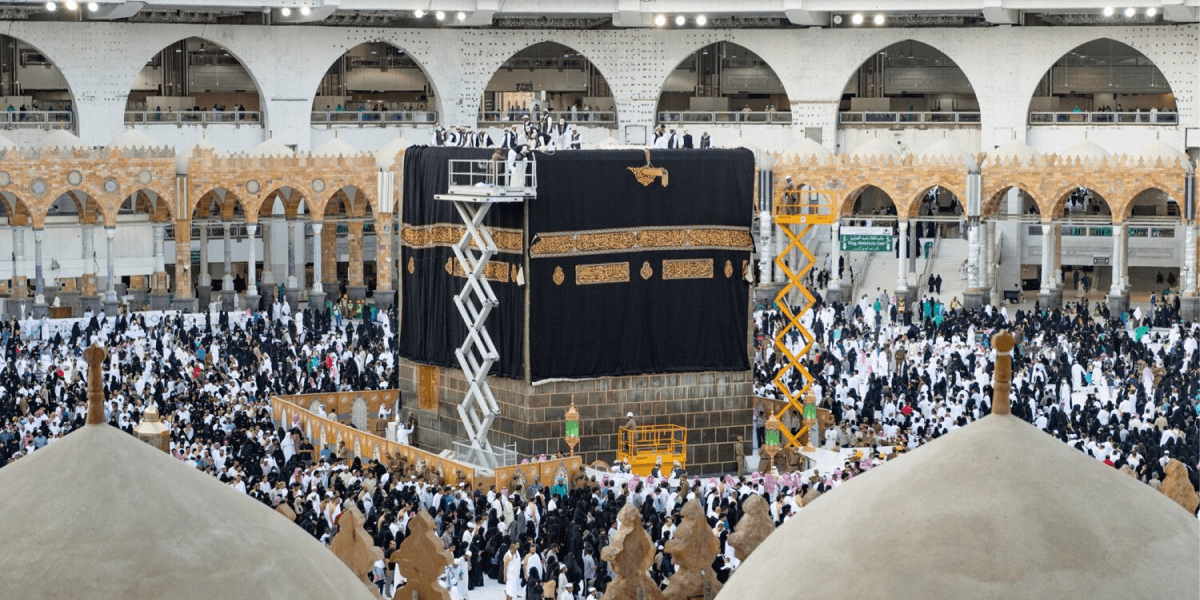What is a Pilgrimage? In Islam and Other Religions – Everything You Need To Know
Whether it is the Islamic Hajj, Christian pilgrimages to holy sites, Jewish visits to the Temple in Jerusalem, or Hindu journeys to sacred rivers and temples, pilgrimages are a fundamental part of various religions.
These spiritual excursions are not merely physical journeys, but transformative experiences that offer believers an opportunity to strengthen their faith, seek spiritual purification, and connect with the divine.
But what is a pilgrimage? In this guide, we will explore the concept of the spiritual journey of pilgrimage across different religions, uncovering its significance, rituals, and the profound impact it has on the lives of those who embark upon this spiritual quest.
What is a Pilgrimage in religion?
A pilgrimage is a journey or a religious excursion undertaken by individuals or groups of people to a sacred place or site that holds significant religious or spiritual importance.
It is a practice observed in various religions around the world, including Islam, Christianity, Judaism, Hinduism, and others. Pilgrimages are often seen as acts of devotion and are an integral part of religious traditions.

How to pronounce Pilgrimage?
Pilgrimage is pronounced as “PILL-gruh-mij.”
Why are pilgrimages important in religions?
Pilgrimages hold great importance in many religious traditions for several reasons. Firstly, they allow individuals to deepen their spiritual connection and devotion to their faith. By embarking on a pilgrimage, believers seek to strengthen their relationship with their deity or higher power.
Secondly, pilgrimages offer an opportunity for reflection, self-discovery, and personal growth. The journey itself often involves physical and mental challenges, requiring individuals to step out of their comfort zones and face hardships. This can lead to a greater sense of humility, gratitude, and a renewed commitment to their religious beliefs.
Pilgrimages also provide a sense of community and unity among believers. People from various backgrounds come together, sharing the same purpose and faith, fostering a sense of solidarity and mutual support.
They serve as a means of commemorating significant events or honoring revered figures from religious history. The sacred sites visited during pilgrimages often have a historical or mythological significance that date back a century or two, often associated with important religious events, miracles, or the lives of prophets and saints.
What is a Pilgrimage in Islam?
In Islam, Hajj is a sacred pilgrimage that holds immense religious significance for Muslims. It is considered one of the Five Pillars of Islam, which are the fundamental acts of worship that shape a Muslim’s faith and practice. Hajj is an obligatory duty for adult Muslims once in their life, who are physically and financially capable of undertaking the journey to the holy city of Mecca in Saudi Arabia.
The importance of Hajj is emphasiSed in the Quran, where Allah commands Muslims to perform this pilgrimage. In Surah Al-Imran (3:97), it is stated: “And Hajj to the House (Kaaba) is a duty that mankind owes to Allah, for those who are able to undertake the journey.” This verse underscores the religious obligation of Hajj and highlights its significance as a duty owed to Allah.
Why do Muslims go on Pilgrimage?
Muslims undertake the pilgrimage of Hajj once in their life to fulfill a religious obligation and seek spiritual purification. It is believed that by performing Hajj, Muslims can have their sins forgiven and start afresh. The journey is seen as a way to draw closer to Allah and to seek His blessings by travelling away from home and embarking on it.
Muslims also go on Hajj to reenact the actions and rituals performed by the Prophet Muhammad (pbuh) during his final pilgrimage. It is considered a way to follow in his footsteps and to strengthen the sense of unity within the Muslim community that extends beyond their home.
How long does Hajj (Pilgrimage) last?
Hajj is performed during specific days of the Islamic lunar month of Dhul-Hijjah, which is the twelfth month of the Islamic calendar. The pilgrimage lasts for approximately five to six days, starting from the 8th and ending on the 12th or 13th of Dhul-Hijjah. However, the preparations and rituals leading up to Hajj can take several weeks.
When preparing for Hajj one must take into account a multitude of factors including the time it may take to get a visa, the cost and the physical and mental preparation hence why preparation starts much further in advance than when Hajj is performed
How to perform Hajj?
Performing Hajj involves a series of rituals and acts of worship that must be carried out in a specific order. It is a detailed process that requires proper guidance and understanding. For a comprehensive guide on how to perform Hajj, click here.
What are the benefits of pilgrimage in Islam?
Pilgrimage in Islam offers numerous benefits to the individuals who undertake this journey. Some of the key benefits include:

- Spiritual Purification and Forgiveness
Hajj is considered a journey of spiritual purification. Muslims believe that by performing the rituals of Hajj with sincerity and devotion, they can attain forgiveness for their sins and achieve spiritual cleansing. The act of repentance and seeking forgiveness during Hajj is emphasiSed in the Quran, where Allah says, “And [due] to Allah from the people is a pilgrimage to the House – for whoever is able to find thereto a way” (Quran 3:97). This act of seeking forgiveness and purifying the soul is a profound benefit of the pilgrimage.
- Unity and Equality
Hajj is a gathering of Muslims from different backgrounds, cultures, and nationalities. The pilgrims all dress in simple white garments (Ihram), removing any distinctions of wealth or social status. This collective experience promotes a sense of unity and equality among Muslims. It serves as a reminder that in the eyes of Allah, all believers are equal, as stated in the Quran:
“O mankind, indeed We have created you from male and female and made you peoples and tribes that you may know one another. Indeed, the most noble of you in the sight of Allah is the most righteous of you” (Quran 49:13).
- Strengthening Faith and Connection with Allah
Hajj provides an opportunity for Muslims to deepen their faith and strengthen their relationship with Allah. Through the performance of various rites and rituals, such as circumambulating the Kaaba and standing in prayer on the plains of Arafat, pilgrims experience a heightened sense of devotion and closeness to their Creator.
This connection with Allah nourishes the spiritual well-being of the pilgrims and reinforces their faith.
- Remembrance of Prophets and Historical Events
The pilgrimage sites in Mecca and Medina are associated with significant events and the lives of Prophets, including Prophet Ibrahim (Abraham) (AS), Prophet Isma’il (Ishmael) (AS), and Prophet Muhammad (SAW).
Muslims visit these sacred sites to honor the prophets and to remember their exemplary lives. This remembrance deepens the pilgrims’ understanding of their religious history and reinforces their commitment to following the teachings of these esteemed prophets.
- Education and Reflection
Hajj serves as an opportunity for learning and reflection. Pilgrims engage in religious lectures, discussions, and spiritual practices during their journey. They gain knowledge about the Islamic faith, its principles, and its teachings.
The immersive experience of Hajj allows for introspection and self-reflection, enabling pilgrims to assess their lives, seek personal growth, and make positive changes.
- Social and Community Bonding
Hajj fosters a sense of community and solidarity among Muslims. The shared experience of pilgrimage creates strong bonds among pilgrims, as they support and assist one another during the physically and emotionally demanding journey.
This communal aspect of Hajj encourages Muslims to build relationships, foster understanding, and develop a sense of empathy and compassion for one another.
- Increased Gratitude and Humility
The challenging aspects of Hajj, such as the physical exertion and the crowded conditions, cultivate humility and gratitude within pilgrims. They learn to appreciate the blessings bestowed upon them by Allah (SWT) and recognise the importance of patience, perseverance, and humility in their lives.
This gratitude and humility carry over beyond the pilgrimage, shaping their character and behavior and has been doing so for more than a century.
What is pilgrimage in Christianity?
Christian Pilgrimage refers to a journey made by individuals to places of religious significance. These places may be holy sites, shrines, or locations associated with biblical events or the lives of saints.
Christian pilgrimages vary across denominations and may include visits to places like Jerusalem, Bethlehem, Rome, Lourdes, or Santiago de Compostela, depending on the tradition and beliefs of the pilgrim. These beliefs go a long way back in history and have been passed down for many centurires.
What is a Catholic pilgrimage?
Catholic pilgrimages are specific to places like the Catholic Church and involve visiting locations that hold religious importance and have been a part of catholic culture for centuries.
These sites may include shrines dedicated to the Virgin Mary, Jesus Christ, saints, or locations associated with significant events in the life of Jesus Christ. Catholic pilgrimages often involve prayer, veneration of relics, participation in Mass, and other devotional practices for Jesus Christ.
What is a pilgrimage in Judaism?
In Judaism, a pilgrimage is known as Aliyah Laregel. It refers to the ancient practice of Jewish people traveling to the Temple in Jerusalem during specific festivals, such as Passover, Shavuot, and Sukkot.
While the Temple no longer stands, the concept of pilgrimage remains important in Judaism as a part of their history, and is a way to connect with the religious and historical roots of the faith.
What is a pilgrimage in Hinduism?
In Hinduism, pilgrimage, known as Tirtha Yatra, is a significant aspect of religious practice. Hindus undertake journeys to sacred sites, temples, rivers, and mountains believed to possess spiritual energy and divine blessings.
Popular Hindu pilgrimage destinations include Varanasi, Rishikesh, Haridwar, Ayodhya, and the four holy sites of Char Dham (Badrinath, Dwarka, Puri, and Rameswaram).
Summary – What is a Pilgrimage?
A pilgrimage is a religious journey undertaken by individuals or groups to sacred places or sites of religious significance. It is an act of devotion, offering opportunities for spiritual growth, self-reflection, and connection with a higher power.
Pilgrimages have existed in various religions for centuries, such as Islam, Christianity, Judaism, and Hinduism, and hold different meanings and practices and significance in their history and traditions.
Explore The New Pilgrim App
The Ultimate App
for Hajj and Umrah!














